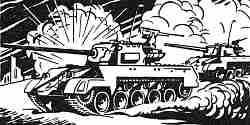|
|
|
14. The Turning Wheel
A Radio Talk by Charles F. Kettering
 When we think of our modern civilization - both in Peace and War,
we must marvel at the ingenuity and complexity of the many things that
make up our World of today. We hear about such things as the Electron Microscope - Radar - jet propulsion and the atom smasher, and we know of the
marvelous devices that helped us win the war - the tanks, the huge
bombers, submarines and amphibious vehicles.
When we think of our modern civilization - both in Peace and War,
we must marvel at the ingenuity and complexity of the many things that
make up our World of today. We hear about such things as the Electron Microscope - Radar - jet propulsion and the atom smasher, and we know of the
marvelous devices that helped us win the war - the tanks, the huge
bombers, submarines and amphibious vehicles.
While we may think of the complicated
nature of all this, in my judgment if we took away just one simple
invention, an idea now over 4,000 years old, warfare on all fronts and
a good part of the activity of our present civilization would cease
almost instantly. That invention, as you may have guessed, is the
wheel. You might suggest other elements such as bearings, lubrication,
steel and wood which may be equally important. Just who invented
the wheel is not known as it is one of those natural evolutions that
has come about as the result of men contributing their ideas
throughout thousands of years.
This useful idea probably started when some
prehistoric ancestor of ours tried to move a heavy object. He might
have first put runners or skids under it and tried to drag it over the
ground. And one day as he pulled it through the forest, it passed over
a log which began to roll and the whole thing moved much easier. So he
began to use runners and rollers together and gradually he used
larger and larger rollers, and then sections of rollers and at last he
put these on axles.
|
|